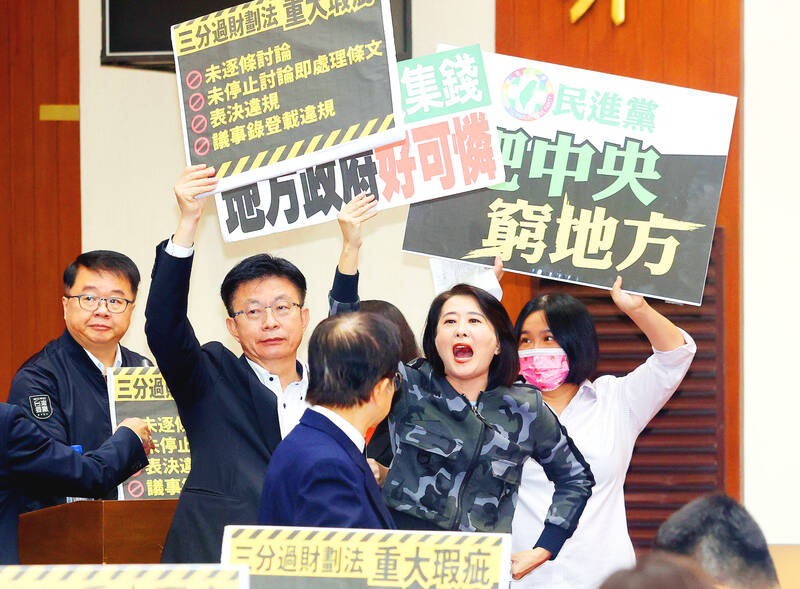Lawmakers noisily disagreed over procedural issues in the Legislature yesterday in relation to an act regulating the allocation of funding between central and local governments, leading to deadlock at the Finance Committee.
Opposition lawmakers shouted and held up placards with the slogan "fat central government, poor local governments" while legislators from the ruling party shouted back and held up signs suggesting there were "major flaws" in legislative procedure over the committee’s earlier handling of the funding bill.
The main opposition Chinese Nationalist Party (KMT), together with the smaller Taiwan People’s Party (TPT), has a majority in the Legislature, and they are seeking to pass 22 amendments to the Act Governing the Allocation of Government Revenues and Expenditures (財政收支劃分法) opposed by the ruling Democratic Progressive Party (DPP).

Photo: CNA
The proposed amendments are aimed at raising the proportion of government revenues that go to local governments at the expense of the central government. Under the current legislation, the central government is allocated 75 percent while local governments are given 25 percent of available funding.
The amendments, if passed into law, would also prevent the central government from reducing the amount of subsidies -- not included in the 75-25 ratio split currently regulated by the act -- that it currently grants to local authorities.
On Nov. 6, KMT Legislator Chen Yu-jen (陳玉珍), then-convener of the Legislature’s Finance Committee, declared the proposed amendments had cleared the committee review stage and adjourned the meeting just three minutes after it started.
However, at the Finance Committee meeting held yesterday under rotating convener of DPP Legislator Lai Hui-yuan (賴惠員), the opposing camps locked horns over how the draft amendments were handled last week.
"Last week’s bill review procedure seriously violated official regulations," DPP Legislator Wu Ping-jui (吳秉叡) told the meeting, referring to the Act Governing the Legislative Yuan’s Power (立法院職權行使法) and the Rules of Procedure of the Legislative Yuan (立法院議事規則). "So we believe the completion [of the draft amendments through the committee stage] should be considered to be invalid."
Wu argued the meeting’s minutes were "not recorded according to the regulations," suggesting that the minutes not be confirmed.
"The DPP also made adjustments to the KMT’s version of the draft amendments," said Chen.
"It was already discussed. If you don’t know that then don’t talk nonsense," she added.
DPP caucus whip Rosalia Wu (吳思瑤) said the disagreement over whether the draft amendments had cleared committee review stage according to regulations was a "major controversy" and called for Legislative Speaker Han Kuo-yu (韓國瑜) to address the issue through cross- party negotiations.
KMT lawmakers called for the issue to be put to a vote, while the DPP requested that officials from the Directorate- General of Budget, Accounting, and Statistics (DGBAS) submit an oral report as scheduled.
As the stand-off continued, some lawmakers pushed and shoved each other in an attempt to seize control of microphones to shout down opposing members of the meeting.
Lai eventually walked off and did not return, causing the remaining lawmakers to disperse at around 5.30 pm.
Without a consensus at the committee concerning the legitimacy of the last meeting’s outcome, the partisan impasse is set to continue over the coming days.

An essay competition jointly organized by a local writing society and a publisher affiliated with the Chinese Communist Party (CCP) might have contravened the Act Governing Relations Between the People of the Taiwan Area and the Mainland Area (臺灣地區與大陸地區人民關係條例), the Mainland Affairs Council (MAC) said on Thursday. “In this case, the partner organization is clearly an agency under the CCP’s Fujian Provincial Committee,” MAC Deputy Minister and spokesperson Liang Wen-chieh (梁文傑) said at a news briefing in Taipei. “It also involves bringing Taiwanese students to China with all-expenses-paid arrangements to attend award ceremonies and camps,” Liang said. Those two “characteristics” are typically sufficient

A magnitude 5.9 earthquake that struck about 33km off the coast of Hualien City was the "main shock" in a series of quakes in the area, with aftershocks expected over the next three days, the Central Weather Administration (CWA) said yesterday. Prior to the magnitude 5.9 quake shaking most of Taiwan at 6:53pm yesterday, six other earthquakes stronger than a magnitude of 4, starting with a magnitude 5.5 quake at 6:09pm, occurred in the area. CWA Seismological Center Director Wu Chien-fu (吳健富) confirmed that the quakes were all part of the same series and that the magnitude 5.5 temblor was

The brilliant blue waters, thick foliage and bucolic atmosphere on this seemingly idyllic archipelago deep in the Pacific Ocean belie the key role it now plays in a titanic geopolitical struggle. Palau is again on the front line as China, and the US and its allies prepare their forces in an intensifying contest for control over the Asia-Pacific region. The democratic nation of just 17,000 people hosts US-controlled airstrips and soon-to-be-completed radar installations that the US military describes as “critical” to monitoring vast swathes of water and airspace. It is also a key piece of the second island chain, a string of

The Central Weather Administration has issued a heat alert for southeastern Taiwan, warning of temperatures as high as 36°C today, while alerting some coastal areas of strong winds later in the day. Kaohsiung’s Neimen District (內門) and Pingtung County’s Neipu Township (內埔) are under an orange heat alert, which warns of temperatures as high as 36°C for three consecutive days, the CWA said, citing southwest winds. The heat would also extend to Tainan’s Nansi (楠西) and Yujing (玉井) districts, as well as Pingtung’s Gaoshu (高樹), Yanpu (鹽埔) and Majia (瑪家) townships, it said, forecasting highs of up to 36°C in those areas